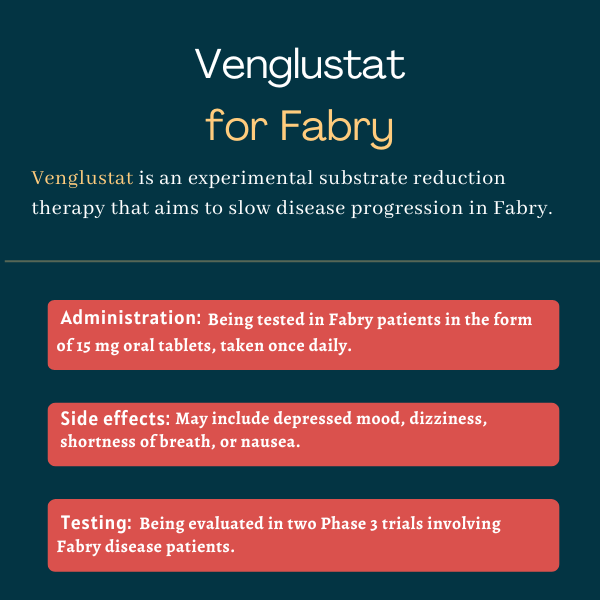Venglustat for Fabry disease
Last updated March 19, 2024, by Lindsey Shapiro, PhD

What is venglustat for Fabry disease?
Venglustat is a substrate reduction therapy for lysosomal storage disorders that’s being developed for the treatment of Fabry disease. It aims to slow or prevent organ damage in patients by reducing the accumulation of toxic molecules in cells.
The oral therapy has been granted fast-track status by the U.S. Food and Drug Administration for Fabry disease, a designation expected to accelerate its development and review.
Venglustat, formerly known as GZ/SAR402671 and ibiglustat, was initially developed by Genzyme, but is now owned by Sanofi after the company acquired Genzyme in 2011. Sanofi also is investigating venglustat as a possible treatment for other metabolic disorders, including GM2 gangliosidosis and Gaucher disease.
Therapy snapshot
| Treatment name: | Venglustat |
| Administration: | Being tested in Fabry disease as oral tablets |
| Clinical testing: | Completed a Phase 2 trial; two Phase 3 studies are ongoing |
How does venglustat work?
In Fabry disease, mutations in the GLA gene result in deficient levels of a working alpha-galactosidase A (Gal A), an enzyme needed to break down certain fatty molecules. The main substrate of Gal A, or the molecule it’s intended to bind and metabolize, is globotriaosylceramide (Gb3), so people with Fabry have a toxic accumulation of Gb3 that damages the body’s tissues.
As a so-called substrate reduction therapy, Venglustat aims to lower Gb3 levels and ease Fabry symptoms, even in the absence of sufficient Gal A. It does this by inhibiting, or blocking, glucosylceramide synthase, an enzyme involved in the production of complex glycosphingolipids, a group of molecules that includes Gb3.
Gaucher disease and GM2 gangliosidosis also are marked by the accumulation of certain glycosphingolipids that similarly require glucosylceramide synthase to be produced. Thus, venglustat is also expected to help those patients.
How will venglustat be administered in Fabry?
In a completed Phase 2 clinical trial, venglustat was given to Fabry patients as once-daily oral capsules containing 15 mg of the medication. This is also the dose being tested in ongoing Phase 3 trials, although the medication is being given in a tablet formulation.
Venglustat in Fabry clinical trials
A small, open-label Phase 2a clinical trial (NCT02228460) evaluated the safety, efficacy, and pharmacological properties of venglustat in 11 men with Fabry disease. The participants, ranging in age from 18 to 37, had not been given any prior treatment for their condition.
All received 15 mg venglustat once daily for 26 weeks, or about six months. Following that, eight patients opted to continue treatment for up to about 2.5 more years in the trial’s extension study (NCT02489344).
The trial’s main goal was to assess reductions in Gb3 accumulation in skin cells after six months, which was evaluated on a severity rating scale from 0-3 by a trained pathologist, a healthcare provider who examines bodies and body tissues.
That goal was not met, with no significant reductions in Gb3 scores observed after six months.
However, after three years, five of six men who remained in the extension trial saw a reduction in Gb3 scores compared with values at the study’s start. Two of them achieved a score of 0, indicating Gb3 was entirely cleared.
The proportion of skin cells where Gb3 clumps were present was significantly reduced after six months, as were blood levels of molecules from the Gb3 synthesis pathway. Both of these results were sustained in the extension trial.
Patients also showed no signs of clinical disease progression in the kidneys, heart, brain, or nervous system over the three-year follow-up, where progressive organ damage is expected in the natural course of the disease.
Ongoing Phase 3 trials
Sanofi now is conducting two Phase 3 clinical trials to look more specifically at the impact of venglustat on certain disease symptoms.
The PERIDOT clinical trial (NCT05206773), launched in 2022 but still recruiting, is investigating whether venglustat can ease abdominal and neuropathic pain — pain related to nerve damage — in Fabry disease patients.
Its total enrollment is expected to be about 114 participants, ages 16 and older, who are either treatment-naïve or have been untreated for at least six months.
The participants will be assigned to receive 15 mg venglustat oral tablets or a placebo, once daily for one year. Then, those who complete the randomized part will have the option to join an open-label extension period in which all will receive venglustat for up to 3o months, or about 2.5 years. PERIDOT is expected to finish in 2026.
The also-ongoing global CARAT trial (NCT05280548) is evaluating venglustat’s effects on left ventricular hypertrophy, a heart disease seen in many Fabry patients. This condition refers to the enlargement and thickening of the muscular wall of the left ventricle, which is the main pumping chamber of the heart.
The study is seeking to enroll approximately 90 adults in all, who are ages 18-65, with Fabry disease, and left ventricular hypertrophy. All will receive daily venglustat or standard Fabry therapies — either enzyme replacement therapy (ERT) or the approved treatment Galafold (migalastat) — for 1.5 years. That will be followed by a long-term extension phase in which participants will be allowed to continue on venglustat treatment for up to 34 months, or nearly three years. CARAT is expected to conclude in 2027.

Common side effects of venglustat
The most common side effects that were deemed related to venglustat treatment in clinical trials include:
- depressed mood
- dizziness
- shortness of breath
- nausea.
This side effect profile is based on data from a small number of treated Fabry disease patients. More information on venglustat’s safety for this indication will become available with additional clinical testing.
Fabry Disease News is strictly a news and information website about the disease. It does not provide medical advice, diagnosis, or treatment. This content is not intended to be a substitute for professional medical advice, diagnosis, or treatment. Always seek the advice of your physician or other qualified health provider with any questions you may have regarding a medical condition. Never disregard professional medical advice or delay in seeking it because of something you have read on this website.
Recent Posts
- A third of Fabry patients in study found to have poor lung function
- Study finds elevated inflammatory markers in Fabry patients
- Why sharing our stories for Fabry Disease Awareness Month is vital
- Enzyme replacement therapy safe in pregnancy for Fabry patient
- Spotlight shines on the ‘Heroes’ during Fabry Awareness Month
- Raising awareness of Fabry disease is crucial to improving quality of life
- Continuing partnership will aid in getting Fabry disease diagnosis
- Same mutation, different outcomes: My family’s Fabry story, part 3
- UK team seeks to boost diagnoses of Fabry in underrepresented groups
- Fabry gene therapy improves heart health after 1 to 2 years
Related articles






